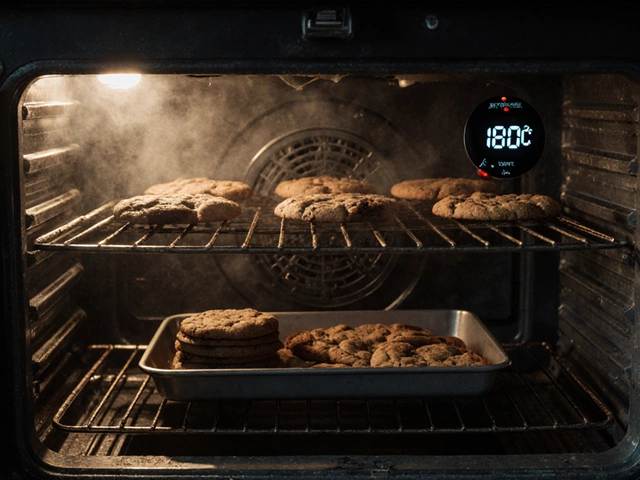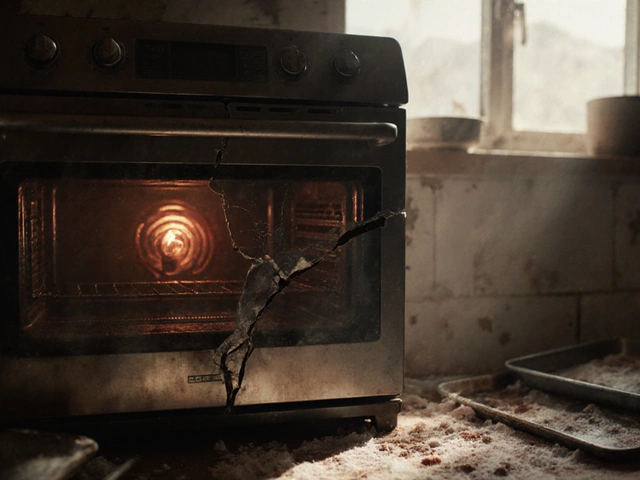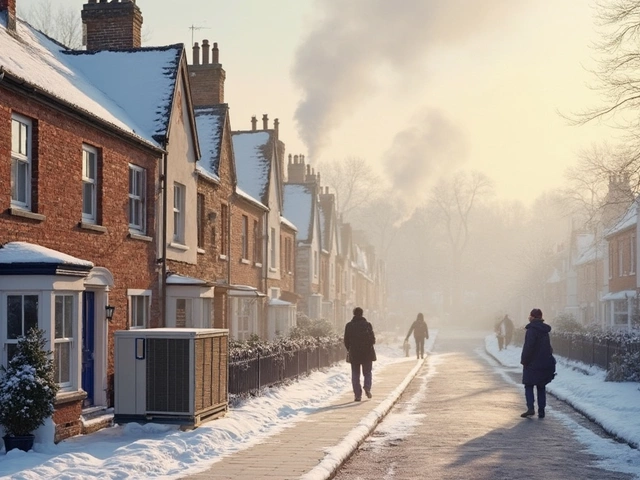As the comforting hum of your boiler becomes a backdrop this winter, you might find it easy to forget about the engine room of your home's warmth. But when should you start listening more closely? Knowing when to worry about your boiler can save you from shivering nights and costly setbacks. Let's dive into the world of boilers for a practical guide on key warning signals you shouldn't ignore.
From mysterious bangs and clangs to subtle drips and fluctuating temperatures, these signs will help you notice when your boiler calls for help. And while some issues demand immediate action, others might just require a simple touch of care. So, how do you tell the difference? Here, we unravel the signs of a struggling boiler and offer straightforward tips to keep it cheerful and running smoothly.
- Recognizing Unusual Noises
- Monitoring Temperature Fluctuations
- Spotting Water Leaks
- Checking Boiler Pressure
- Detecting Foul Smells
- Routine Maintenance Tips
Recognizing Unusual Noises
Have you ever stood in your kitchen, only to be startled by a clattering noise echoing through your pipes? It’s not the sound of a ghostly midnight train; more likely, it’s your boiler attempting to communicate. Boilers, like any other machines, speak their own language through bangs, whooshes, and rattles that should not be ignored. Recognizing these signs is crucial for timely boiler repair. The type of noise often provides the first clue on the health of your heating system. A whistling noise, reminiscent of a tea kettle ready to pour, is known as 'kettling'. This is generally caused by a build-up of limescale or sludge on the heat exchanger, restricting water flow and causing it to overheat and steam. Kettling not only affects the efficiency of your system but might also shorten its lifespan significantly.
On the other hand, if you hear a banging or knocking noise, especially when the boiler is first heating up, this could indicate trapped air within the system or an issue with the boiler ignition. In many cases, such noises mean that the water pressure might be too low, or there could be a pump failure. Investigating these mysteries is not just insightful but essential for keeping your home warm and cozy. Clanging and rattling may be due to loose parts or sediment in the system that need immediate cleaning or replacement. A humming sound, often mistaken for normal operation, could be a red flag for a failing pump or fan inside the boiler.
Decoding Boiler Sounds
Understanding these sounds and what they mean can empower homeowners. A high-pitched sound, screaming through your boiler’s walls, often points to a pressure issue arising possibly from a loss of air in the expansion tank or a broken valve. The rhythmic tapping is less musical and more concerning, potentially indicative of serious underlying issues like steam bubbles in the water due to improper water flow or excess mineral deposits. No matter the melody, these sounds warrant attention. According to boiler expert John Blake, "A well-functioning boiler should operate almost silently. Regular, unusual noises are a harbinger of future breakdowns". You can identify the urgency of calling in professional help based on the sound alone. The longer they persist, the more likely the issue will cause further damage to the heating system, or unexpectedly send it into complete dysfunction when you need it the most.
Dwelling on these signs, it’s helpful to periodically track and interpret the noise against a checklist of common issues. Look for changes over time to make informed decisions about maintenance or boiler repair. Creating a proactive regime by listening to and documenting these sounds can save you considerably in terms of costly repairs. It might even be worth investing in an annual servicing plan, which not only covers minor fixes but could include periodic sound assessments. With these insights, maintaining the hum of warmth in your home becomes a proactive art rather than a daunting chore.
Monitoring Temperature Fluctuations
One of the simplest ways to gauge the health of your boiler is by keeping an eye on how consistently it delivers hot water and heat. Fluctuations in temperature are often the first sign of trouble brewing behind the scenes. If you're in the shower and find yourself jumping from icy cold to boiling hot water, it’s a red flag. Such inconsistency might indicate a problem with your boiler's thermostat or a buildup of sludge or limescale in the system. Addressing these issues early not only saves discomfort but can prevent more significant, costlier repairs down the line.
Temperature fluctuations are not just uncomfortable; they signal inefficiency. An efficient boiler, often a home’s most energy-consuming appliance, should work quietly in the background, supplying even, predictable heat. If it can't, it's using more fuel and costing more money. Sometimes the issue might stem from air trapped in the heating system or a faulty circulation pump. In such cases, bleeding the radiators or checking the pump for malfunctions might help. Professional expertise can save you from guesswork, ensuring your heating system runs smoothly.
According to the Energy Saving Trust, a regular check of your boiler's temperature settings and analyzing boiler flow can significantly cut down on energy waste. After all, why let your boiler gobble up unnecessary energy which inflates your bills? Regular inefficiency checks can help pin down the issue, which may just stem from simple blockages or more serious scale buildup. Ensuring that your boiler is clean and maintained can keep the heart of your home's warmth running for years.
"We often find that simple signs like inconsistent heating are dismissed until they develop into major breakdowns," says John Trek, a seasoned heating engineer. "Early intervention can save you hundreds and provide peace of mind during the winters."
In households with children or elderly family members, reliable heat is more than just a comfort; it’s a necessity. This makes monitoring your boiler's behavior, from the clunk of pipes when they heat up to the strange hums on quiet evenings, a smart habit. Again, don't hesitate too long—while little sounds and quirks could be benign, it's worth erring on the side of caution. Professional checks seem bothersome, but they are a form of long-term insurance not just for comfort, but also for safety.
For peace of mind, consider investing in a smart thermostat. These handy gadgets provide a detailed map of your boiler's performance, notifying you of any irregularities. Anomalies in temperature can be tracked and rectified faster, ensuring that your boiler maintenance is proactive rather than reactive. Plus, smart technology often leads to smarter energy use, cutting down wasted resources and saving you money in the long run.
Finally, bear in mind that boiler systems may degrade quietly over time. So, if your boiler is over a decade old, you might notice more frequent fluctuations and inefficiencies. While you might be tempted to patch these issues over repeatedly, it is sometimes more cost-effective to consider an upgrade. Modern boilers bring not only better efficiency but also advanced features that ensure temperature consistency, safety, and ease of use. This translates to savings on both energy bills and repair costs, ensuring your family stays comfortable and safe during those frosty months.

Spotting Water Leaks
Water leaks are more than just an inconvenience; they're a clarion call that your boiler repair may be overdue. Leaks often begin as a subtle drip, practically whispering their presence while hinting at underlying issues within the system. Crucially, even the smallest leak can indicate larger problems, like corrosion or compromised seals within the heating system. Observing water pooling around your boiler area shouldn't be taken lightly, as it could escalate into serious structural damage if left unchecked. Examine the connections carefully, including the expansion tank itself; something as simple as a loose joint can sometimes be the culprit.
Pinpointing the source of a leak often demands a hands-on approach. Begin by inspecting visible pipes and joints for any signs of dampness or mineral deposit buildup, both hinting at prolonged leaks. Use a flashlight to explore those tricky, hard-to-reach spots, ensuring no small damp patch goes unnoticed. If you're vigilant, you might spot a leak early enough to prevent more extensive damage. While your boiler functions under pressure to deliver warmth, a defect that allows pressure to escape can lead to an imbalance, complicating the issue at hand. Keeping an eye on the pressure gauge periodically can serve as a solid preventative measure.
There are, of course, warning signals even before significant leaks occur. You might hear a boiler making a hissing or whistling noise, known historically as 'kettling,' indicative of trapped water transforming into steam because of obstructions like limescale build-up. These tell-tale signs should prompt you to act swiftly. One would want to drain the system periodically to combat sediment buildup and other obstructions, which may have led to the pressure point causing the leak. A professional inspection of the boiler maintenance regime can reinforce your assurance that everything is in optimal functioning order.
No discussion of leaks would be complete without addressing safety. A leaking boiler coupled with electrical systems nearby is a recipe for potential disaster, warranting immediate disconnection and professional assistance. According to experts from the Efficiency and Safety Institute, 'Routine check-ups and timely interventions can effectively mitigate risks associated with home heating systems.'
The earlier you address a leak, the less you spend on costly repairs and the safer your indoor environment remains.Remember, addressing leaks promptly not only prolongs the lifespan of your boiler but also ensures optimal safety and energy efficiency. Ignoring these signs can culminate in inefficiencies that far outweigh the initial chaos of a leak.
Checking Boiler Pressure
When it comes to your home heating system, keeping an eye on your boiler's pressure is not just a good habit—it's a necessity. The pressure gauge is like the pulse monitor of your boiler, giving you direct insight into how effectively your boiler is operating. Generally, the pressure should be between 1 and 2 bars when the heating is active, but various factors can throw this balance off. Low pressure means your boiler is not producing the heat or hot water needed, while high pressure might indicate blockages or perhaps a faulty relief valve. It is essential to know that these issues won't simply go away on their own, and ignoring them could result in costly repairs or even system failure.
A simple way to check the pressure is to look at the gauge on the front of the boiler. If you notice a drop below the recommended range, you might have a leak or air trapped within the system. Conversely, if it’s too high, your radiators could be overly filled with water. To remedy low pressure, most systems come with an easy-to-use filling loop. Follow the manual's instructions and ensure both valves are closed when done to maintain the precise pressure. Mind you, if you're constantly having to adjust this, it suggests a more serious issue that might warrant professional boiler repair services.
“Maintaining the proper pressure in your boiler is crucial for efficiency and preventing potential hazards,” advises the Chartered Institute of Plumbing and Heating Engineering. “Ensure you regularly check and adjust your boiler pressure to ensure safe and effective operation.”Overlooking frequent pressure changes can also lead to bigger problems such as damaged heat exchangers or pumps, which would be far more expensive to replace. Be proactive about checking the boiler's pressure especially after doing maintenance or bleeding radiators. An easy preventive measure to ensure your heating stays optimal through colder months.
Furthermore, repeated high pressure can be an even bigger red flag. This could be due to blockages or a malfunctioning expansion vessel. In rare cases, none of the DIY approaches may yield positive results. It might be time to bring in a professional. They have the precise tools to diagnose your heating system for underlying causes such as a clogged pump or equalized pressure within the system. Don’t ignore persistent issues; call in a specialist to ensure that your heating system issues don’t leave you in the cold.

Detecting Foul Smells
Foul smells emanating from your boiler are not just an olfactory nuisance—they are often red flags indicating serious issues. You might catch a whiff of something unusual, resembling the scent of rotten eggs or scorched metal. These odors should promptly capture your attention, as they might signal the presence of a gas leak, which is both hazardous and potentially life-threatening. Noticeable especially in older units, sensing such smells means it's time to inspect your **heating system** more diligently.
What Causes the Smell?
The characteristic rotten egg smell is often associated with natural gas leaks, as it's intentionally scented with mercaptan to help detect its presence. Natural gas is odorless and colorless, making such additives necessary for leak detection. If you sense this odor, it's critical to act swiftly since prolonged exposure can lead to serious health risks, from nausea to more severe respiratory issues. Another culprit contributing to foul smells may be the accumulation of sediment, metallic debris, or even the natural corrosion of aged pipelines, all of which can disrupt your **boiler's efficiency** and elevate operational risks.
Steps to Address Foul Smells
If the smell is prompting a sudden concern, it’s prudent to perform a visual check around your boiler system. Here’s a simple checklist to guide you:
- Ensure your home is well-ventilated. Open windows and doors immediately.
- Avoid igniting any flame or causing any spark, as a leak can dramatically raise flammability.
- Check if the pilot light of the boiler is still burning correctly.
- In case of suspected gas leaks, evacuate the premises and contact an emergency professional without delay.
If the foul smell persists without any visible signs of a leak, regularly scheduled maintenance might be overdue. Professional technicians can perform an in-depth inspection, helping to remove sediment buildup safely and check for unnoticed elements that might be compromising air quality.
"Safety with your boiler begins with vigilance. An unpleasant smell should never be ignored, and timely action can prevent both hazards and hefty repairs." — Safety and Home Maintenance Expert
Despite seeming innocuous, unpleasant smells around your *boiler* should always be approached with caution. By addressing issues when they're first noticed, not only can you safeguard your family's health, but you also significantly extend the lifespan of your valuable **heating system**.
Routine Maintenance Tips
Taking care of your boiler doesn't have to be a daunting task. Think of it like a simple, friendly chat you have with an old buddy to keep the relationship in good repair. Regular maintenance not only prolongs the life of your *heating system* but also keeps it running efficiently, trimming down those hefty energy bills. A pinch of prevention here and there goes a long way, but where should you start? Let's dig into some effective routine maintenance tips that are easy to follow but incredibly rewarding.
First, consider scheduling a yearly check-up with a professional technician. It's like putting your heating system through an annual physical, ensuring everything is working as it should be. Keeping a regular service calendar can catch potential issues before they become expensive headaches. Remember, safety first—professional eyes can spot dangers you might overlook yourself.
Next, it’s time to cozy up with your heating system by regularly checking its pressure. Proper boiler pressure is crucial for consistent heating, and the task isn't reserved for experts only. Once a month, take a moment to glance at the pressure gauge. Ideally, it should read around 1 to 1.5 bars when cold. If it's outside this sweet spot, refer to your user manual for guidance or consult a professional to rectify it.
Moving on, bleed your radiators as needed. Air trapped in the system can lead to uneven heating, with your boiler working double-time to maintain temperature. This process, which involves releasing air bubbles by turning the bleed valve, is simple but powerful. It ensures your boiler doesn’t work harder than necessary, giving it a much-needed breather.
According to British Gas, "Regular maintenance can reduce boiler breakdowns by nearly 75% and slash the repair costs by up to 90% when tackled early." That's quite a save, isn’t it?
Don't neglect to inspect for any water leaks routinely. Even small drips can indicate larger problems and may cause damage if left unattended. It's always best to address these promptly before they escalate. Once in a while, give the boiler system a good cleaning, particularly the filters and vents which can become clogged over time. This build-up can stifle efficiency, leading to energy wastage and decreased boiler performance.
Boiler maintenance extends beyond the machine itself. Examine the space around it. Make sure it's free from clutter, providing enough ventilation for the combustion process. Proper airflow reduces the risk of overheating and malfunctioning, safeguarding the enduring vitality of your heating hero. Implementing these uncomplicated checks into your home's monthly routine doesn’t just save money but fosters peace of mind. Your boiler works hard to keep your family warm; it’s time to return the favor with a little TLC.





